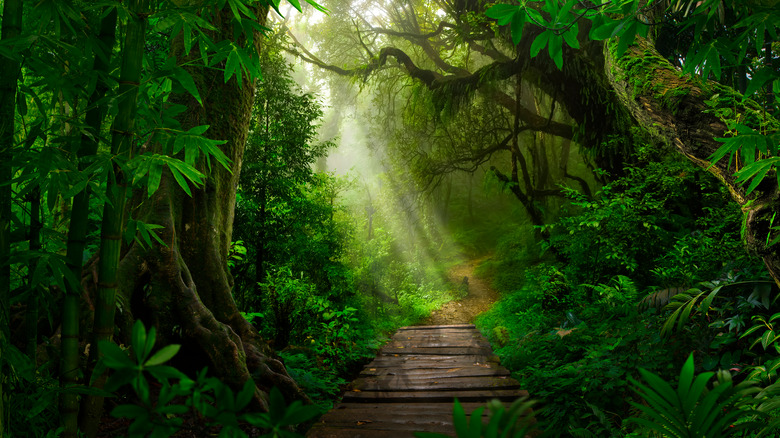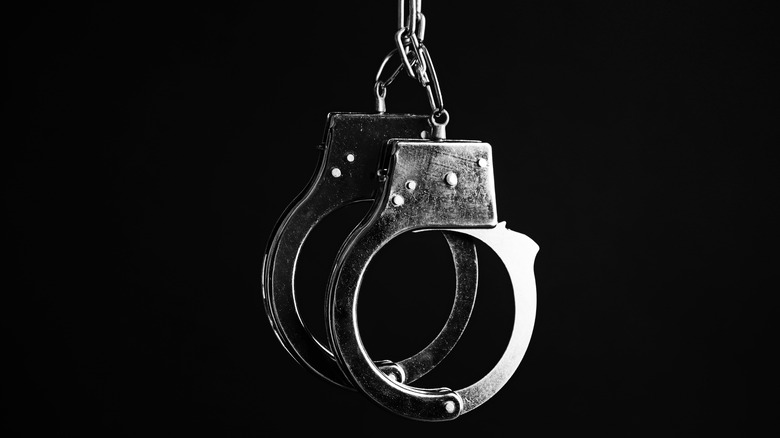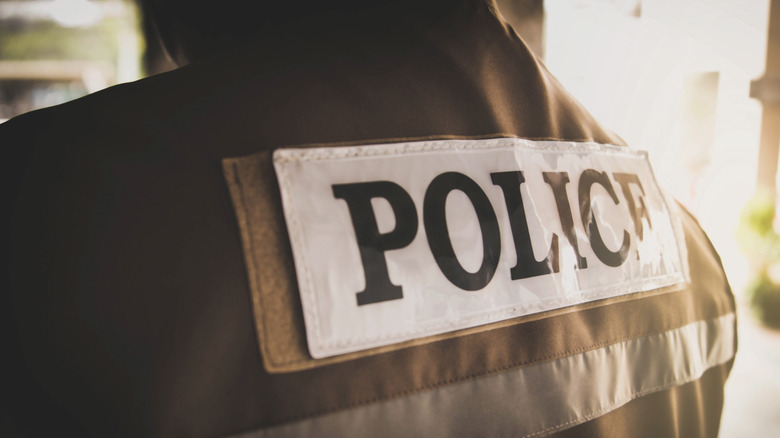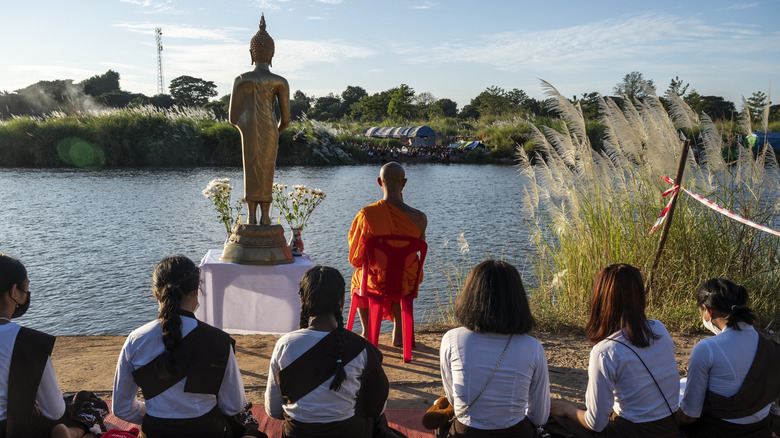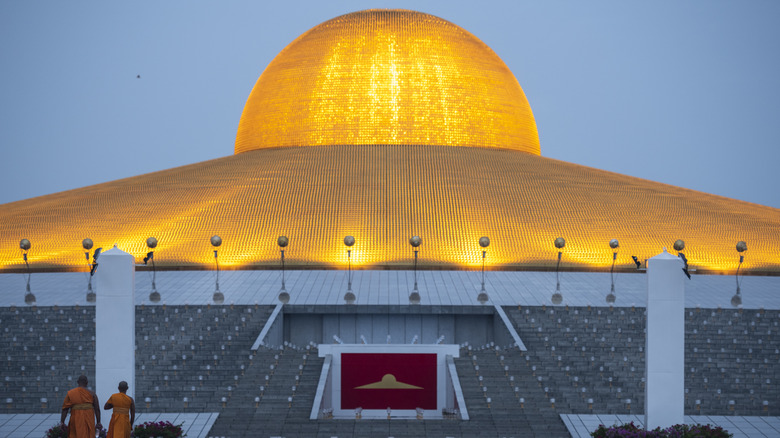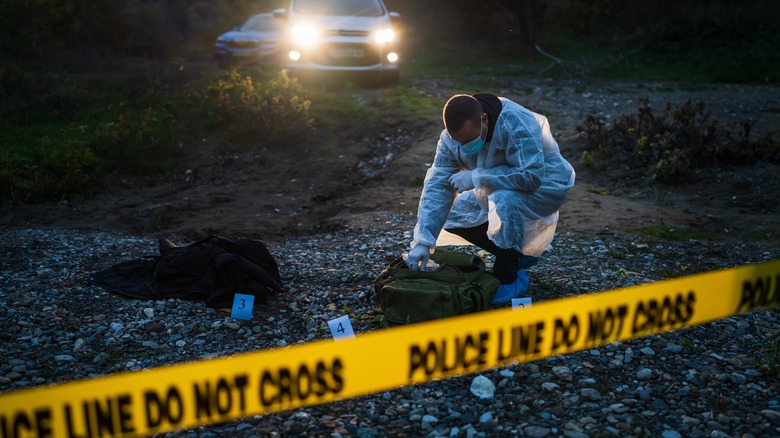The Gruesome Practices Of Recently-Arrested Thai Cult Leader Thawee Nanra
In May 2022, authorities in Thailand arrested the leader of a cult who coerced his followers into a series of bizarre and disturbing practices, including worshiping corpses and even consuming his bodily fluids as a way of curing their illnesses. According to The Sydney Morning Herald, the cult made its home in the jungles of northeastern Thailand and was led by a 75-year-old man named Thawee Nanra. Police raided Thawee's remote, thatched-roof home, and while the self-proclaimed holy man was led away by law enforcement officials, his followers screamed and pleaded with police to let him go.
Kraisorn Kongchalad, the governor of Chaiyaphum province, where the cult was based, expressed his surprise that a group like this even existed today. "It's quite disturbing to see that there are people who believe in such superstition. But this is not only about a personal belief any more," he said. "We have dead bodies, and we will have to work with all agencies to establish facts surrounding these individuals."
Who is Thawee Nanra?
The 75-year-old, bearded, white-haired, and shirtless man dragged out of his small compound in the Thai jungle didn't exactly cut an impressive figure, but if the accusations against him are true, he exhibited immense control over the dozen or so followers who lived on his compound. Police believe that Thawee managed to lead his group in relative anonymity for as long as four years because of their remote location, which helped keep the disturbing rituals he peddled to stay under the radar.
Officials say that those rituals involved worshiping corpses and convincing followers that consuming his bodily fluids, as well as his dried skin and dandruff, could cure any disease, per The Independent. What Thawee was up to came to light through a woman who lived nearby, whose mother had visited his home and then never returned. The woman informed a famous Thai social media celebrity known for exposing frauds, and this in turn caught the attention of Thai authorities.
Why was Thawee arrested?
According to The Sydney Morning Herald, the initial charges that brought police to Thawee's door were far from the sordid ones that came out later. Police made their way to his remote home because it was built on public land, and their initial intent was to charge the cult leader with encroaching on a forested area, and for violating laws regarding large gatherings, put in place due to the coronavirus pandemic. Upon their arrival, police found much more.
Police found 11 bodies on the land surrounding Thawee's home. These corpses, stored in coffins, were worshiped as part of the cult's rituals. Thawee's possession of the corpses could potentially lead to more charges as police look into charging him with unlawful disposal of bodies.
According to All That's Interesting, Thawee told police that he "didn't force anybody to stay here or do anything they didn't want to." As he was being taken away from his home in the back of a police car, his followers reportedly chased the car down the road.
Religion in Thailand
An overwhelming majority of the Thai population is Buddhist. According to a 2020 report from the U.S. State Department, 85% to 95% of the population is Theravada Buddhist, while 5% to 10% are Muslim. The remainder of the population is comprised of several other groups, including Christians, Jews, and Sikhs. Additionally, while practicing Hindus make up a relatively small portion, there is a significant Hindu influence on certain religious practices in the country. According to Britannica, many of these customs stem from immigrants who arrived in the country and passed them down to their descendants. There are shrines to Hindu deities scattered around the country, including a shrine to the Hindu god Brahma at the Erawan Hotel in Bangkok, which typically sees hundreds of visitors every day,
However, as The Sydney Morning Herald reported, there is a significant number of people in the country who hold additional views that fall outside the scope of traditional religion. These can involve worshiping local spirits as well as practices aimed at warding off ghosts. As such, the nation has also been home to its share of cults.
Other cults in Thailand
According to the Thai Enquirer, cults and cult-like groups are not uncommon across that country, and there have been several recent — and disturbing — cases of cult activity in addition to Thawee's. In 2019, a cult emerged on the island of Koh Phangan that targeted young female students. The women were promised spiritual enlightenment but were instead sexually abused by the group's founder.
Last year saw a bizarre incident in which an elderly monk died by decapitating himself with a homemade device built by himself and his followers. The monk reportedly did this in an attempt to reincarnate himself as a higher being. According to Vice, this act was condemned by the majority of the nation's Buddhist community.
Another group within the country that has at times received the "cult" label is known as the Dhammakaya movement, a large, prominent Buddhist sect that has been accused of exploiting its followers to raise money, The movement has been around for over 50 years and has branches in more than 30 countries around the world (via Australia's Special Broadcasting Service News).
If you or anyone you know has been a victim of sexual assault, help is available. Visit the Rape, Abuse & Incest National Network website or contact RAINN's National Helpline at 1-800-656-HOPE (4673).
If you or anyone you know is having suicidal thoughts, please call the National Suicide Prevention Lifeline at 1-800-273-TALK (8255).
What's next for Thawee and his cult?
The investigation into Thawee Nanra's cult is expected to continue, especially into the identities of the corpses found around his home. According to the Thai Enquirer, the group was only able to provide authorities with death certificates for five of the 11 bodies discovered to be in the cult's possession. Officials have ordered autopsies on the bodies to determine the manner of their deaths.
Those who were aware of the group said that they acted in religious-like ways and referred to Thawee as "father." Khun Jenjira, whose mother joined Thawee's cult, described to the Daily Mail how they lived: "I saw how women were forced to follow a dress code by wearing a knee-length sarong and men had to wear formal trousers. Everybody had to remove their shoes before entering the site." Jenjira also explained how Thawee's followers thought that consuming his bodily fluids would keep them safe from diseases, including COVID-19.
